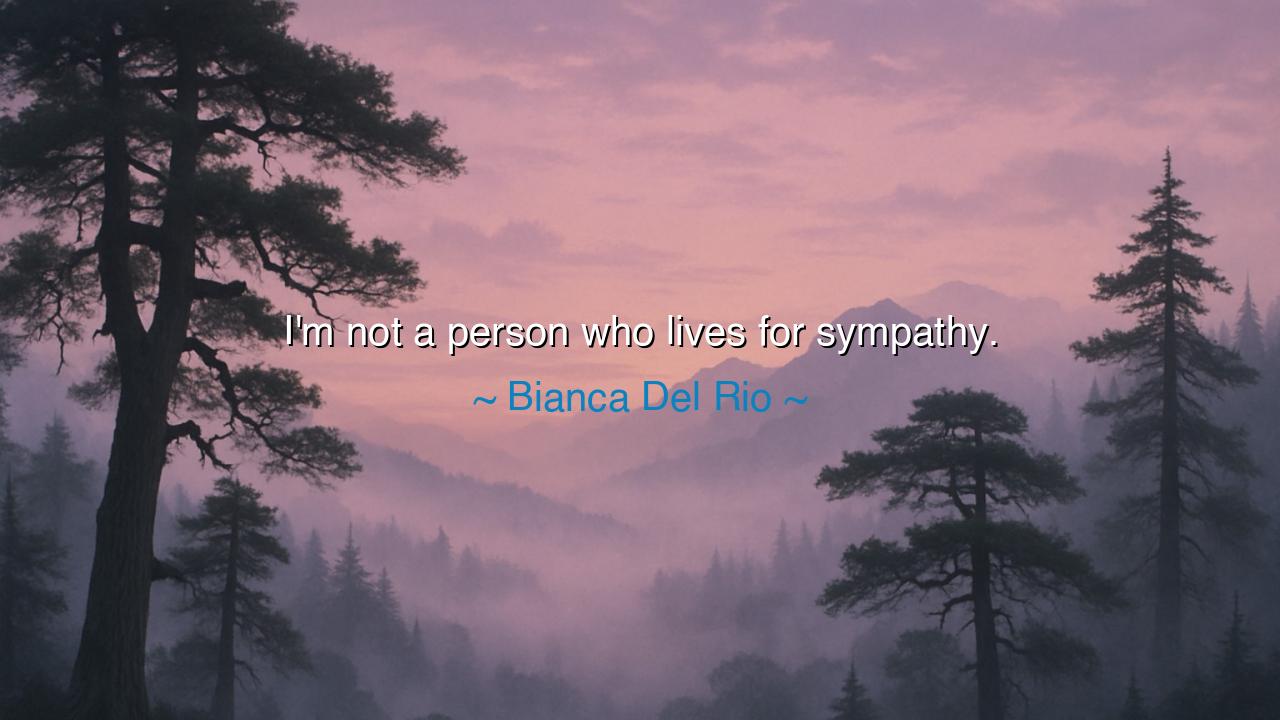
I'm not a person who lives for sympathy.






Children, gather close and listen to the words of Bianca Del Rio, who with strength and conviction states: "I'm not a person who lives for sympathy." In these words, there lies a powerful truth, one that resonates through the ages—sympathy is not the currency by which we should measure our worth, nor should we live to seek it. Sympathy, though often well-meaning, can sometimes be a shackling force that binds us to a life of dependence on the pity of others. To live by sympathy is to invite the world to see us as victims rather than agents of our own destiny. True strength comes not from others feeling sorry for us, but from the deep resolve to stand on our own, to rise through hardship with dignity and purpose.
Consider, children, the ancient tale of Heracles, the great hero of Greece. Though he endured many trials, none of them were marked by seeking sympathy. Heracles’ strength did not come from others' pity for his hardships, but from his unwavering will to face challenges head-on, no matter how difficult they seemed. He did not wait for others to show compassion for his struggles—he chose instead to conquer them with his own strength, his own courage. In this way, Heracles embodied the wisdom that to seek sympathy is to relinquish your own power, while to endure without it is to grow into something truly remarkable.
Bianca Del Rio, too, in her refusal to live for sympathy, calls us to take up the mantle of self-reliance and resilience. There is a strength in facing life’s trials without expecting the world to feel sorry for us. This is not to say that we should be without compassion or that we should turn away from others in their time of need. No, compassion is the spirit that connects us all, but to live for sympathy is to live with an expectation that others owe us their pity. It is a life of powerlessness, one where we are defined not by our actions, but by the struggles we face. True empowerment lies in facing those struggles with the knowledge that we are capable of overcoming them, without relying on others to validate our worth.
Think of Marcus Aurelius, the philosopher-king, who, though ruler of the vast Roman Empire, never sought sympathy for his position or struggles. His stoic philosophy taught him that the only thing we can control is our own response to the world. Even as Aurelius faced war, plague, and political turmoil, he did not look for sympathy from his people or his fellow leaders. Instead, he focused on what he could control: his actions, his wisdom, and his ability to lead with integrity. His life is a shining example of the ancient wisdom that the strength of a person lies not in the favors they seek, but in the virtue they embody through their own choices.
This brings us to a lesson that you, my children, must carry with you as you grow: do not seek sympathy, for it is not in others' pity that you will find your worth, but in your own ability to face life with courage and resolve. Life will bring struggles—there is no escaping that. But it is in how we rise from those challenges, how we meet adversity with strength, that we define who we truly are. The greatest men and women throughout history, from Socrates to Nelson Mandela, have faced immense hardship, yet none of them sought sympathy for their struggles. They sought justice, they sought change, and they sought strength—not pity.
So, children, let the example of Bianca Del Rio, of Heracles, and of Marcus Aurelius guide you in your own lives. When faced with challenges, do not look to others for sympathy, but instead find your strength in your own resolve. Sympathy may come in times of need, but do not make it the foundation of your identity. You are more than the trials you face. You are the strength with which you meet those trials, and the wisdom with which you rise above them. Live not for sympathy, but for the courage to walk through life as your own person, unwavering, unbowed, and always rising.
Thus, children, remember: the world will offer many paths, but the one most worthy of your steps is the path where you seek neither the approval nor the pity of others, but the strength to stand firm, no matter the storm that surrounds you. Let your life be an example of self-determination, of integrity, and of resolve—for it is through these that true greatness is born.






AAdministratorAdministrator
Welcome, honored guests. Please leave a comment, we will respond soon